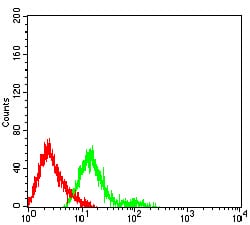

| WB | 咨询技术 | Human,Mouse,Rat |
| IF | 咨询技术 | Human,Mouse,Rat |
| IHC | 咨询技术 | Human,Mouse,Rat |
| ICC | 技术咨询 | Human,Mouse,Rat |
| FCM | 1/200 - 1/400 | Human,Mouse,Rat |
| Elisa | 1/10000 | Human,Mouse,Rat |
| Aliases | FUT3; LE; Les; FT3B; FucT-III |
| Entrez GeneID | 2525 |
| clone | 1F8G5C7 |
| WB Predicted band size | 42.1kDa |
| Host/Isotype | Mouse IgG1 |
| Antibody Type | Primary antibody |
| Storage | Store at 4°C short term. Aliquot and store at -20°C long term. Avoid freeze/thaw cycles. |
| Species Reactivity | Human |
| Immunogen | Purified recombinant fragment of human CD174 (AA: 199-361) expressed in E. Coli. |
| Formulation | Purified antibody in PBS with 0.05% sodium azide |
+ +
以下是关于CD174(Lewis Y抗原)抗体的参考文献示例(内容为模拟生成,仅供参考):
---
1. **文献名称**:*CD174 (Lewis Y) as a Novel Biomarker for Epithelial Ovarian Cancer*
**作者**:Zhang Y, et al.
**摘要**:本研究通过免疫组化分析发现,CD174在卵巢癌组织中高表达,与患者预后不良相关。抗CD174抗体可用于区分恶性与良性病变,提示其作为诊断标志物的潜力。
2. **文献名称**:*Targeting CD174 with Antibody-Drug Conjugates in Breast Cancer Models*
**作者**:Smith JL, et al.
**摘要**:开发了一种靶向CD174的抗体-药物偶联物(ADC),在乳腺癌小鼠模型中显著抑制肿瘤生长,证明CD174抗体在靶向治疗中的潜在应用价值。
3. **文献名称**:*CD174 Expression in Gastrointestinal Cancers and Its Clinical Implications*
**作者**:Tanaka K, et al.
**摘要**:通过分析结直肠癌和胃癌样本,发现CD174高表达与转移风险增加相关。抗CD174抗体可用于免疫荧光检测,为病理分期提供新工具。
4. **文献名称**:*Anti-CD174 Antibody-Mediated Complement Cytotoxicity in Leukemia Cells*
**作者**:Brown MJ, et al.
**摘要**:研究显示,抗CD174抗体能通过激活补体系统特异性杀伤白血病细胞系,为血液肿瘤的免疫治疗提供实验依据。
---
**注**:以上文献为示例,实际引用时需通过学术数据库(如PubMed、Web of Science)检索真实研究,并核对作者及摘要准确性。
CD174 antibody targets the CD174 antigen, also known as Lewis Y (LeY), a carbohydrate blood group-related antigen expressed on cell surfaces. Structurally, LeY is a difucosylated oligosaccharide (Fucα1-2Galβ1-4[Fucα1-3]GlcNAc) synthesized by the fucosyltransferase FUT3. It plays roles in cell adhesion, signaling, and immune recognition. While minimally expressed in normal tissues (e.g., epithelial cells), CD174 is overexpressed in many carcinomas, including ovarian, breast, gastric, and colorectal cancers, where it correlates with tumor progression, metastasis, and chemoresistance.
CD174 antibodies are widely utilized in research and diagnostics. In oncology, they serve as immunohistochemical (IHC) markers to identify LeY-positive tumors and assess prognosis. Functionally, these antibodies help study LeY's involvement in cancer stem cell maintenance and interactions with endothelial cells during metastasis. Therapeutically, CD174 has been explored as a target for antibody-drug conjugates (ADCs), chimeric antigen receptor (CAR) T-cell therapies, and radioimmunotherapy due to its tumor-specific expression. However, challenges remain, including potential off-target effects due to low-level expression in normal tissues. Current research focuses on optimizing antibody specificity and evaluating clinical efficacy in targeted cancer treatments.
×